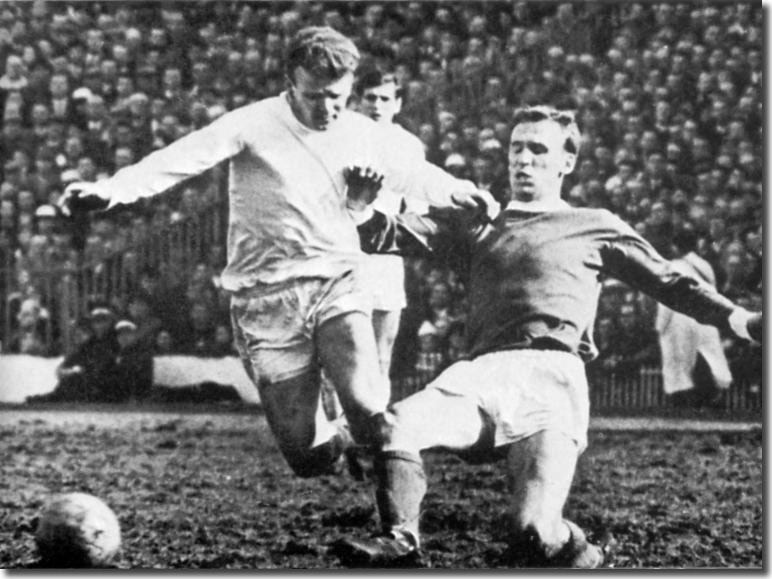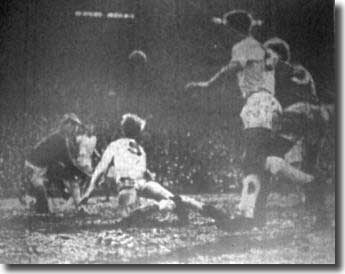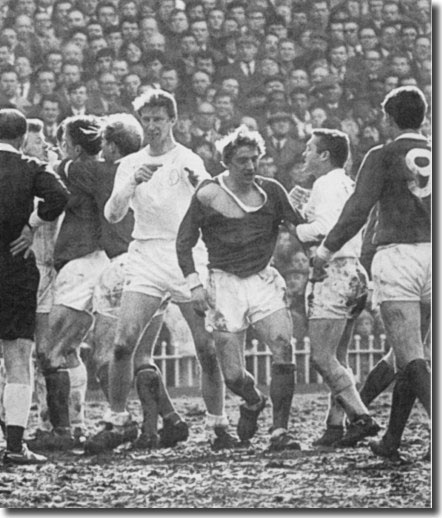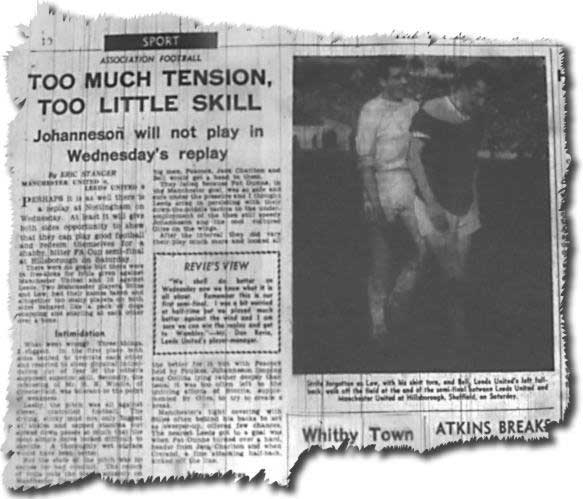 |
 |
 |
 |
 |
 |
 |
 |
 |
FA Cup semi-final - Hillsborough - 65,000
Scorers: None
Manchester United: P Dunne, Brennan, A Dunne, Crerand, Foulkes, Stiles, Connelly, R Charlton, Herd, Law, Best
Leeds United: Sprake, Reaney, Bell, Bremner, J Charlton, Hunter, Giles, Storrie, Peacock, Collins, Johanneson
Leeds had only once before gone as far as the last eight, when John
Charles was centre-half in the side that came close to beating mighty
Arsenal in 1950. The Yorkshire club's normal fate was an early exit, and
the ten seasons between 1953 and 1962 had yielded not a single victory,
an astonishingly tepid record by any standards. By contrast, the Red Devils had won the Cup on three occasions, with
the most recent being only two years previously, and had finished runners-p
twice during the Fifties. Add in five league championship successes and
six second places, and one can appreciate exactly how much richer was
their history than that of their still relatively humble opponents. Indeed,
the Peacocks could point to only two Second Division championships, in
1924 and 1964,
in terms of any major silverware. However, as the two sides prepared for the semi-final they were separated
by just a single point in the chase for the First Division title, with
only Chelsea (due to face Liverpool in the other semi) sitting above them. The Yorkshiremen's rise to prominence under manager Don
Revie had been startling, and they could point to a
win earlier in the season at Old Trafford. That victory, gained at
the beginning of December, had come during a lengthy unbeaten run, now
extended to 20 games after a 4-1 victory against Everton. Leeds had earlier
in the season also gained the scalps of reigning
Division One title winners Liverpool and were confident as they prepared
for the biggest game in the club's history. Their Manchester rivals were also supremely self-assured, understandably
so, given the renown of their all star forward line, John Connelly, Bobby
Charlton, David Herd, Denis Law and George Best. They were determined
not to be intimidated by the reputation of Leeds for roughhouse tactics.
In October, the Whites had participated in an infamous
clash with Everton at Goodison Park, when their 1-0 win was gained
during a near riot with crowd and players alike losing their heads. The two sides did not really care for each other at all. The Yorkshire
United were the classic outsiders, kicking at the doors of the feast,
eager to prick the balloon of much vaunted opposition. Matt Busby's world-beaters,
on the other hand, considered their opponents uncouth and poorly qualified
for being on the same pitch as them. George Best's recollection is probably quite typical of the views held
by his team mates: 'That Leeds team are now remembered as the most cynical
football team of all time. Although they did deserve that reputation,
I hated playing against them, I really did, it must be remembered that
they also had a hell of a lot of skill, too, but they were still a bloody
nightmare. 'But my little anecdote tends to sum them up. It concerns Matt Busby
who, in a team talk before meeting Leeds, went through each member of
their side. It must be remembered that Busby loved Man United but he was
also a fiercely patriotic Scot. 'Anyway, Matt went like this: "Gary Sprake, the goalkeeper ... on
his day a nasty piece of work. Right-back, Paul Reaney ... dirty bastard.
Left-back, Terry Cooper ... even dirtier bastard. Johnny Giles ... dirty
little bastard. Centre-half, Jack Charlton
... dirty big bastard. Right-half, wee Billy Bremner ... good Scottish
boy!"' For Best, Paul Reaney came to be a feared spectre at the feast over the
years; he was usually detailed to man mark the gifted Irishman, and had
done so successfully during the match between the two teams in December.
But Best had enjoyed even closer attention from another player, as recounted
by Rob Bagchi and Paul Rogerson in The Unforgiven: 'In one of the
autobiographies George Best gives a good example from that Old Trafford
encounter of their adventurous aggression: "As the two teams walked
down the tunnel," he wrote in The Best of Times, "I felt
a terrific pain in my right calf as someone kicked me with brute force.
I turned. It was Bobby Collins.
'And that's just for starters, Bestie,' he said." Reprehensible,
obviously, and entirely contrary to the spirit of the game, but one can't
help being amused by the sheer audacity of the man - and the naked malevolence
of the act. 'Collins knew that fear worked. If a player is intimidated, the likelihood
is that he will give his opponent more time - a footballer's most precious
commodity. Collins took it further than most would dare, far too far for
some tastes, but it was highly effective. Over the next five years, as
Manchester United conquered Europe and George Best was at his peak, he
tore countless teams to shreds, but for all his sublime ability he never
once dominated a game against Leeds United. It wasn't because Best was
physically frightened by Leeds, simply that Leeds were prepared to use
every 'But it wasn't a cowardly approach. Nobby Stiles, Best's protector in
chief, took his team mate's revenge. "Every time you come down our
right hand side and kick George, you filthy bastard," he shouted
at Collins, slamming him into the perimeter wall in a forceful tackle,
"I'm going to friggin' well hit you like that, only harder."
Collins got up to score the only goal of the game. He had started it,
taken the retribution as fair punishment, continued to hound Best despite
Stiles' injunctions and still led his team to maximum points. That was
the hyperactive impudence that came to characterise Revie's Leeds.' Certainly, Manchester United had little reason to look forward to the
clash with Leeds. There was a bitter and unlovely tension developing between
the players of the two clubs. The significance of the occasion and the
evident determination not to lose only served to heighten that feeling. Both teams were at full strength for a match played in front of a capacity
65,000 crowd, and from the first seconds it was clear that this was to
be a fearful war of attrition and anger, as reported in The Times:
'This was a rough and tumble: tough, with the rumble of trouble from the
start when Bremner sawed down R Charlton in full flight. The English player
usually is the gentlest of creatures. But now he retaliated immediately
in anger, wagged his finger in admonition and from that first act the
battle quickly slipped into a black mood that only matched the dark stage
itself, a heavy churned up pitch made sticky by heavy overnight rain. 'Manchester, having heard of the dog's bad name, clearly were themselves
determined not to be bitten. But, in wishing to be master, some of them
took matters too far and in the end it was Leeds, paradoxically, who were
more sinned against than sinning as a final ratio of three infringements
against the one in their favour showed.' Eric Stanger in the Yorkshire Post: 'What went wrong? Three things,
I suggest. In the first place, both sides tended to overrate each other
and resorted to sheer physical intimidation out of fear of the other's
supposed superior skill. Secondly, the refereeing of Mr R H Windle of
Chesterfield was tolerant to the point of weakness. Lastly, the pitch
was all against clever, controlled football. The drying, sticky mud not
only tugged at ankles and sapped stamina, but slowed down passes so much
that the most simple move looked difficult to execute. A thoroughly wet
surface would have been better.' For all that Billy Bremner provoked much of the early unpleasantness
with aggressive assaults on both Law and Charlton, it was the Leeds man
who suffered most during the opening twenty minutes. He was felled on
a number of occasions, once rising with a bloodied nose, and shortly afterwards
nearly scoring an own goal as he volleyed Connelly's centre from two yards
out. Sprake fielded his sliced clearance. Leeds soon rallied, and Peacock
came close to steering home Collins' free kick after 18 minutes with Storrie
and Johanneson threatening. But it soon became very clear that this was not to be a flowing game
as the teams dug in for trench warfare. Stiles played sweeper for the
Red Devils, while In an ugly first half Leeds restricted themselves for the most part to
launching long range free kicks high into the Manchester goal area for
Peacock, Charlton and Bell to contest. Unfortunately for them, goalkeeper
Pat Dunne had an exemplary game and dealt expertly with everything coming
his way. When the Peacocks tried a more cultured approach, feeding Giles and Johanneson
on the flanks, both men were brutally dealt with, Stiles being the main
enforcer. It was no surprise that there was not a goal to show for all
the effort at the interval. Things degenerated even more in the second half, with Stiles and Crerand
leaving Johanneson a limping passenger, while Bremner did the same to
Best. With Peacock well checked by Foulkes, and Law and Bobby Charlton
more concerned with demonstrating their tackling than attacking flair,
the game slumped into a messy, undisciplined struggle for survival. Stiles and Law were booked for bad fouls on Johanneson and Bell, and
the only surprise was that more players were not cautioned or even dismissed. There was one particular clash after an hour that transcended everything
that had gone before and referee Dick Windle clearly bottled it, declining
to take the action that was required to get the game under control. Denis
Law went chasing after Jack Charlton, seemingly intent on making a point.
He caught up with the centre-half and blocked him forcefully. Charlton
lost control of his temper and fists started flying. The flare up was
the signal for the pent up anger of all the warriors to be vented, and
players from both sides piled in. Crerand and Bremner clashed violently
and Stiles and Hunter had to be physically separated. It was several minutes before calm was restored, with Law's shirt torn
to shreds and left hanging loosely from his shoulder for the rest of the
contest. The tussle had resembled a full-scale public house brawl. Windle
took no action, choosing only to tick Law off and award a free kick to
Leeds. His tolerance was inexplicable. Law said later, 'I was going for the ball, but my shirt was not going
with me. Jack Charlton had grabbed a handful of it and was trying to hold
me back, I lashed out at Jack and we began swapping punches. I was unaware
that our team mates had joined the fray and there were fists flying all
over the place.' Charlton: 'You had to hang on to Denis because he was so sharp and so
good in the air. I used to hate playing against him.' The match rumbled on fiercely to a goalless draw, with the final scoreline
of fouls reading 24 by Manchester to The Times summarised thus: 'The sooner Manchester United and Leeds
United take a hard appraising look at themselves and each other in the
cracked mirror of Hillsborough, Sheffield, the better for all concerned
before they come to shape the replay of this FA Cup semi final tie at
the Nottingham Forest ground on Wednesday. 'They will now see behind them only the broken image of two renowned
clubs and a sad distortion of the game of football. It would be simple
enough to turn to the chilly comfort of philosophy, to suggest that all
should be forgotten and a fresh start made, but it is not as easy as that. 'This angry, shabby affair of naked intimidation and moments of physical
violence should be held up as a permanent warning to all those who bow
to mammon at the expense of ethical standards. Those who live by the sword
in the end may find it to be double edged. 'Here, indeed, was a hard day's diet. It was achieved by two sides afraid
of each other and unable to look defeat in the eye. The fact that no more
than some four or five of the 22 players were the true culprits is neither
here nor there. This ill starred coterie poisoned the whole atmosphere,
stirred bad blood, brought passages of bedlam and left an unpleasant taste
in the mouth of a packed 65,000 crowd already sharply divided in its partisan
camps of Yorkshire and Lancashire.' Bobby Collins: 'The first game was a bit naughty, but that was caused
by them; they started things, but typical of the media at the time Manchester
did not receive the criticism that we would have for employing similar
tactics. There were a number of unsavoury incidents, the worst when Big
Jack and Denis Law clashed. Billy and Pat Crerand got involved in the
mix and it set the tone of the game. It was a terrible pitch and a really
tough match. We were second best before half time but had the edge in
the second half. At the end I was convinced we would win the replay.' It was anybody's guess as to what unpleasantness would emerge the
following Wednesday.  As
the two Uniteds from Manchester and Leeds clashed in the semi final of
the FA Cup at Sheffield Wednesday's Hillsborough stadium in March 1965,
the records of the two clubs in the famous old competition could scarcely
have been more contrasting.
As
the two Uniteds from Manchester and Leeds clashed in the semi final of
the FA Cup at Sheffield Wednesday's Hillsborough stadium in March 1965,
the records of the two clubs in the famous old competition could scarcely
have been more contrasting. weapon
at their disposal to stop him playing, whether physical, psychological,
tactical or, like the tunnel assault, borderline criminal.
weapon
at their disposal to stop him playing, whether physical, psychological,
tactical or, like the tunnel assault, borderline criminal. Reaney, Bremner and Hunter seemed to be chiefly concerned with preventing
Best, Law and Charlton from making any positive contribution. Throughout,
there was little time or space allowed for anybody to get control of the
game or display any skill. When a player attempted to do so, they were
quickly left in no doubt that savage retribution would be swiftly forthcoming
for their impudence.
Reaney, Bremner and Hunter seemed to be chiefly concerned with preventing
Best, Law and Charlton from making any positive contribution. Throughout,
there was little time or space allowed for anybody to get control of the
game or display any skill. When a player attempted to do so, they were
quickly left in no doubt that savage retribution would be swiftly forthcoming
for their impudence. 10
by Leeds.
10
by Leeds.